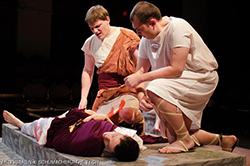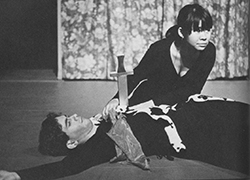Stratford on Charles: MIT’s History with the Bard Continues
-
-
slice.mit.edu
Filed Under
Recommended
 Julius Caesar
Julius Caesar
He’d fit right in. The bard’s love of science and engineering is quite evident in his works, from his observational study (“Smooth runs the water where the brook is deep”) to his lab-rat verse (“Eye of newt and toe of frog, wool of bat and tongue of dog”).
And Shakespeare’s work has had a home on the Charles since 1992, when Ford Foundation Professor in the Humanities Peter Donaldson created the MIT Shakespeare Project. Wouldn't you love to sit with Shakespeare as he surfed through the MIT Electronic Archive of his works?
Most endearing for Shakespeare, whose 449th birthday we celebrated on April 23, might be to take in a production of the MIT Shakespeare Ensemble, like their recent performance of Julius Caesar.
This spring’s production riffed on the classic tale by casting females in two of the leading roles: Brutus and Cassius. Ensemble president Katie Roe (Brutus) enjoyed bringing that gender complexity to the stage to add to the themes of power, pride, and corruption. In the second week of performances, the ensemble invited alumni from past performances back for a reception.
Shakespeare knew that blood sells tickets (the word appears 447 times in Macbeth), so the ensemble knows to take it seriously, too, even assigning a “blood tech” to the stage crew.
“Our first weekend, we had some interesting experiences with getting the blood packets to pop at the right place at the right time,” said Roe. “It’s a challenge. This semester, we also ordered the blood from a company rather than make it ourselves. But we have several recipes we've used in the past.”
Staging Shakespeare well is always a challenge. Jim Walker '79, who performed in eight plays during his undergraduate years, has many fond memories, like playing Falstaff with an enormous fat suit, “which made me sweat like crazy,” he recalled.
Patrick Gabridge '88 remembered hauling the stage, piece by piece, out of Walker for the ensemble’s 1987 production of Much Ado About Nothing.
“I think it was the last production before we used modular portable staging. But something about constructing the stage together was a very useful ensemble building exercise.”
How to toast the Bard these days? April is National Poetry Month, a good reason to crack open his sonnets and enjoy a little iambic pentameter. Consider it the 16th-century equivalent, perhaps, of finely crafted C+ code.








